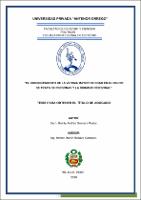Mostrar el registro sencillo del ítem
El consentimiento de la víctima mayor de edad en el delito de trata de personas y la dignidad personal
| dc.contributor.advisor | Rebaza Carrasco, Héctor Martín | |
| dc.contributor.author | Guevara Pastor, Branly Andrés | |
| dc.creator | Guevara Pastor, Branly Andrés | |
| dc.date.accessioned | 2018-06-14T22:45:47Z | |
| dc.date.available | 2018-06-14T22:45:47Z | |
| dc.date.issued | 2018 | |
| dc.identifier.uri | https://hdl.handle.net/20.500.12759/4141 | |
| dc.description.abstract | El presente trabajo de investigación tiene como objetivo general el determinar si el consentimiento de la víctima mayor de edad en el delito de Trata de Personas vulnera la dignidad de la persona humana. En la recopilación de información doctrinaria y normativa para la elaboración de los capítulos del marco teórico se utilizó las fuentes de consulta, el método dogmático, hermenéutico y exegético, apoyado en las técnicas del fichaje y análisis documental acorde con los objetivos específicos de la investigación En lo que atañe a los resultados más importantes se obtuvo que el crecimiento de la Trata de Personas motivó la dación de Instrumentos Internacionales como el Protocolo de Palermo, en Argentina, Colombia, Panamá, Bolivia y México sin importar edad de la víctima el consentimiento no tiene efectos jurídicos, recién con la Ley Nº 28950 se regula con el nombre de Trata de Personas que luego es mejorada con la Ley N° 30251, que se vulnera la dignidad humana al tener como finalidad la explotación sexual, laboral o cosificación de la persona. La conclusión principal es que el consentimiento de la víctima mayor de edad en el delito de Trata de Personas vulnera la dignidad de la persona humana, por cuanto es de naturaleza indisponible, siendo necesario la modificación del inciso 4 del artículo 153 del Código Penal en donde el consentimiento de la víctima no exima de responsabilidad penal al sujeto agente. | es_PE |
| dc.description.abstract | The general objective of this research work is to determine whether the consent of the victim of legal age in the crime of human trafficking violates the dignity of the human person. In the compilation of doctrinal and normative information for the elaboration of the chapters of the theoretical framework the sources of consultation, the dogmatic, hermeneutic and exegetical method, supported by the techniques of the signing and analysis documentary according to the specific objectives of the research, were used. Regarding the most important results, it was found that the growth of human trafficking is the reason for international instruments such as the Palermo protocol, in Argentina, Colombia, Panama, Bolivia and Mexico, regardless of the victim's age. It has legal effects, just with the law No. 28950 is regulated by the name of trafficking in persons, which is then improved by Law No. 30251, which violates human dignity by having as a purpose the sexual exploitation, labor or reification of the person. The main conclusion is that the consent of the victim of age in the crime of human trafficking violates the dignity of the human person, as it is of an unavailable nature, being necessary the modification of subsection 4 of article 153 of the penal code where the consent of the victim does not exempt the agent subject from criminal liability. | en_US |
| dc.description.uri | Tesis | es_PE |
| dc.format | application/pdf | es_PE |
| dc.language.iso | spa | es_PE |
| dc.publisher | Universidad Privada Antenor Orrego - UPAO | es_PE |
| dc.relation.ispartofseries | T_DERE_405 | |
| dc.rights | info:eu-repo/semantics/openAccess | es_PE |
| dc.source | Repositorio Institucional - UPAO | es_PE |
| dc.source | Universidad Privada Antenor Orrego | es_PE |
| dc.subject | Consentimiento | es_PE |
| dc.subject | Víctima mayor de edad | es_PE |
| dc.subject | Delito de trata de personas | es_PE |
| dc.subject | Dignidad humana | es_PE |
| dc.title | El consentimiento de la víctima mayor de edad en el delito de trata de personas y la dignidad personal | es_PE |
| dc.type | info:eu-repo/semantics/bachelorThesis | es_PE |
| thesis.degree.level | Título Profesional | es_PE |
| thesis.degree.grantor | Universidad Privada Antenor Orrego. Facultad de Derecho y Ciencias Políticas | es_PE |
| thesis.degree.name | Abogado | es_PE |
| thesis.degree.discipline | Derecho | es_PE |
Ficheros en el ítem
Este ítem aparece en la(s) siguiente(s) colección(es)
-
Derecho [424]

